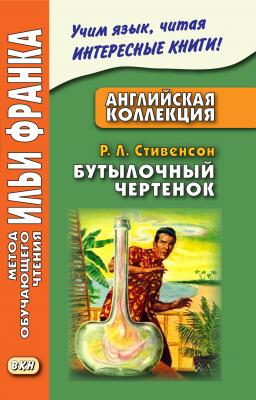ТОП просматриваемых книг сайта:
Английская коллекция. Р. Л. Стивенсон. Бутылочный чертенок / Robert Louis Stevenson. The Bottle Imp. Роберт Стивенсон
Читать онлайн.Название Английская коллекция. Р. Л. Стивенсон. Бутылочный чертенок / Robert Louis Stevenson. The Bottle Imp
Год выпуска 2017
isbn 978-5-7873-1119-8
Автор произведения Роберт Стивенсон
Жанр Иностранные языки
Серия Метод обучающего чтения Ильи Франка
Издательство Издательский дом ВКН
“The house (дом)?” asked Keawe (спросил Кэаве).
reason ['ri:z(ǝ)n], trouble ['trʌbl], future ['fju:tʃǝ]
“There is no reason,” said the man, “why you should not have a house in all points similar to this, and finer, if you wish. You have some money, I suppose?”
“I have fifty dollars,” said Keawe; “but a house like this will cost more than fifty dollars.”
The man made a computation.
“I am sorry you have no more,” said he, “for it may raise you trouble in the future; but it shall be yours at fifty dollars.”
“The house?” asked Keawe.
“No, not the house (нет, не дом),” replied the man (ответил мужчина); “but the bottle (а бутылка). For, I must tell you, although I appear to you so rich and fortunate (потому что, должен вам сказать, хотя я и кажусь вам таким богатым и удачливым; to appear – появляться, показываться; казаться, производить впечатление), all my fortune, and this house itself and its garden, came out of a bottle not much bigger than a pint (все мое состояние, и сам этот дом, и сад при нем, появились из бутылки /размером/ немногим больше пинты; fortune – счастье, удача; богатство, состояние; to come out; pint – пинта /мера емкости; в Англии = 0,57 л; в США = 0,47 л для жидкостей и 0,55 л для сыпучих тел/). This is it (вот она).”
although [ɔ:l'ðǝʋ], appear [ǝ'pɪǝ], fortunate ['fɔ:tʃ(ǝ)nǝt]
“No, not the house,” replied the man; “but the bottle. For, I must tell you, although I appear to you so rich and fortunate, all my fortune, and this house itself and its garden, came out of a bottle not much bigger than a pint. This is it.”
And he opened a lockfast place (и он открыл надежно запертый шкаф; lockfast – крепко, основательно запертый; запертый на замок; lock – замок; запор; затвор; fast – прочный; крепкий; place – место, пространство; место, помещение специального назначения), and took out a round-bellied bottle with a long neck (и достал круглую пузатую бутылку с длинным горлышком; to take out; round – круглый, шарообразный; belly – живот, брюхо, пузо; neck – шея; горлышко /бутылки/); the glass of it was white like milk (стекло ее = бутылки было белым, как молоко), with changing rainbow colours in the grain (и в толще /своей/ переливалось всеми цветами радуги: «с изменяющимися радужными цветами в /самой/ структуре /стекла/»; grain – зерно, хлебные злаки; структура, текстура, строение).
Withinsides something obscurely moved, like a shadow and a fire (внутри же что-то смутно двигалось, подобно теням и /языкам/ пламени: «словно тень и огонь»).
rainbow ['reɪnbǝʋ], colours ['kʌlǝz], obscurely [ǝb'skjʋǝlɪ]
And he opened a lockfast place, and took out a round-bellied bottle with a long neck; the glass of it was white like milk, with changing rainbow colours in the grain.
Withinsides something obscurely moved, like a shadow and a fire.
“This is the bottle (вот та самая бутылка),” said the man; and, when Keawe laughed (и когда Кэаве засмеялся), “You do not believe me (вы мне не верите)?” he added (добавил он). “Try, then, for yourself (в таком случае, попробуйте сами; to try – пытаться, стараться; пробовать, проверять). See if you can break it (посмотрим, сможете ли вы разбить ее; to see – видеть; узнавать, выяснять; to break – ломать; разбивать).”
So Keawe took the bottle up and dashed it on the floor till he was weary (тогда Кэаве поднял бутылку и /стал/ швырять ее на пол до тех пор, пока не утомился: «не стал усталым»; to take up; to dash – бросаться, мчаться); but it jumped on the floor like a child's ball, and was not injured (но она отскакивала от пола, словно детский мяч, /но так и/ не разбилась: «но она скакала на полу, как мяч ребенка, и не была поврежденной»; to injure – ушибить, ранить; портить, причинять вред).
“This is a strange thing (как странно: «это странное дело»; strange – незнакомый, неизвестный, чужой; странный, чудной; thing – вещь, предмет; явление, дело),” said Keawe. “For by the touch of it, as well as by the look, the bottle should be of glass (ведь на ощупь и на вид эта бутылка должна быть = кажется сделанной из стекла; touch – прикосновение, касание; тактильные ощущения; look – взгляд; вид).”
weary ['wɪǝrɪ], injured ['ɪndʒǝd], touch [tʌtʃ]
“This is the bottle,” said the man; and, when Keawe laughed, “You do not believe me?” he added. “Try, then, for yourself. See if you can break it.”
So

